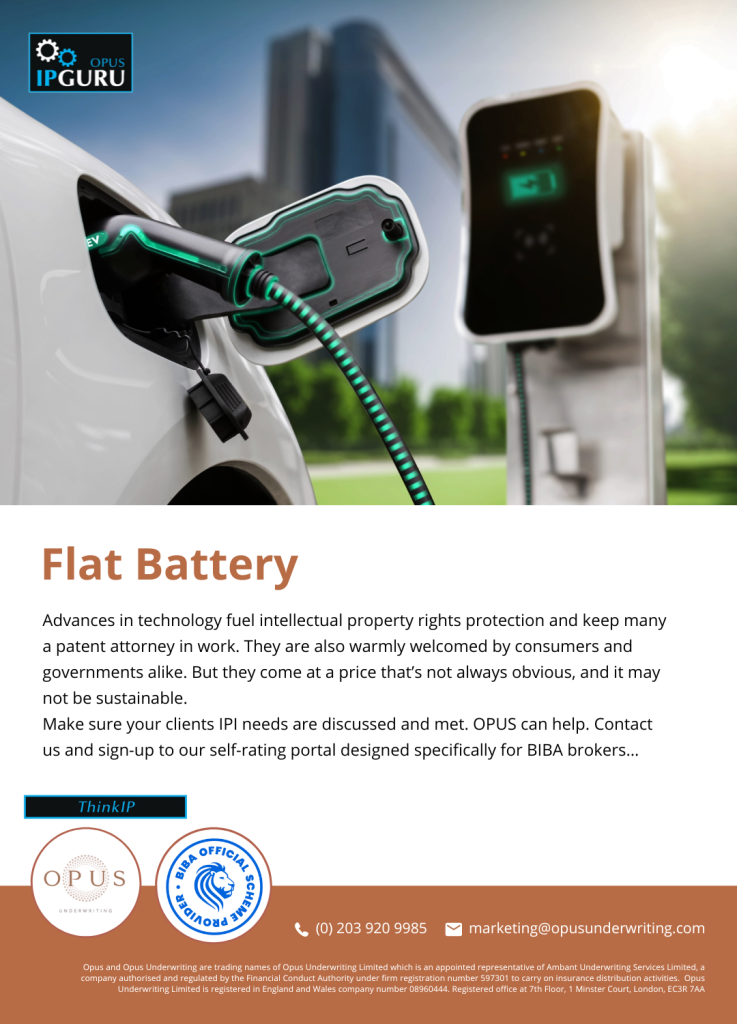Environment Matters
There’s a hole in my bucket
As any decent gardener and Just Stop Oil protester will tell you: it’s all about the environment. There are two environments (and there is a link…eventually) that we ought to be focusing on.
Firstly, Electric Vehicles. Intellectual Property-rich territory given the enforced move towards them by most of the western world and much of the rest, including China. Not just the batteries, the charging process and kit but the driver-free know-how too. Tesla’s patents, for example, focus on the electronics – battery, circuitry, and propulsion. It’s all novel, stuffed with cutting-edge, bespoke design. All IP protected. Some EV’s are akin to a new smartphone. Just look at their dashboards or displays as they are now called. There’s such a package of new tech to adjust to, it’s difficult for the average consumer to know where to start.
What we do know is that to thrive and evolve their tech in real world conditions, EV manufacturers need the right environment if they are not to go the way of the northern white rhinoceros. Which is a distinct possibility in the UK, given the woeful lack of charging infra-structure. We don’t seem to offer any environment, good or bad. So, we have a great innovation, laden with IP, cast on sand rather than seeded efficiently in our green and increasingly wet but still pleasant land.
The wrong trousers
Secondly, an old friend to these pages, AI. It’s very definitely in an environment that is pushing it, funding it, and promoting it forwards as its wunderkind. But it may well be in the wrong environment. One in which a collection of nerdy, super-rich, tech ‘kids’ are wasting its potential for good, on ‘version 114’ of a slightly better telephone/Filofax. Now that would be a waste. We’ll just have to be patient, as required with all children, and see how it plays out.
Bandwagon blues
Just a few weeks ago Apple, succumbed to the allure of AI with a formal commercial link with OpenAI so it can integrate AI into its new iPhones and incorporate ChatGPT. Truth be told, Apple were off the curve a bit with their own AI advances – time to piggyback another’s. It’s how that industry, and many others, work. It upset Elon Musk, that’s for sure. There’s history between him and OpenAI. He’s reported as livid and considering banning all Apple devices from his companies.
Anyway, around the corner and coming to a store near you is a phone with Chat GPT built into Siri for free. Must be a good thing, right? Can’t wait. There’s useful for you, and here’s how it was described:
“Siri will also understand more of the things that people want to get done in iPhone apps. For instance, users can ask it to show a photo of a friend and it will find and surface those images for people in the Photos app.”
Mankind is saved then. It’s what we all need; another Tim Cook “indispensable” feature. Curing cancer can wait. I was worried a consumer-touch iPhone replete with AI might be a vacuous pursuit. Looks like I was as ‘wrong’ as a Luddite.
“Today was about showing that they [Apple] will make A.I. a core competency and that they can deliver an A.I. experience that consumers want.”
So said Gene Munster an investor and asset manager in emerging tech companies. Keep singing for your supper Gene.
Wrong environment for AI, a wasted opportunity or will it all shake-out ok in the end? You decide.
The Artful Dodger
Only this week, AI, like the bad IP penny it is rapidly becoming, was in the news again involved in allegations of stealing copyright music. The big music companies, themselves quite adept in their day in ‘harvesting’ talent to its bone, picked a legal fight with music AI ‘upstarts’ Suno and Udio for trawling copyright songs without consent or compensation to feed their AI threshing machines. The ‘upstarts’ are claiming a ‘fair use’ defence whilst the big companies allege “wholesale theft”, saying they have illegally copied songs to make a pile of cash on the backs of others efforts. Hmmm, sounds like the music industry hasn’t changed all that much even under the influence of AI.
But theft if theft, and, like the old warning on VHS pirate videos used to say, even if the property taken is intellectual and intangible in nature. 25 years on and its fair to say we struggle a lot less with the concept of IP theft. That’s progress.
Toxic shock
So bad is the ChatGPT and the OpenAI environment for some ex-employees, they are demanding;
“…a right to warn about advanced artificial intelligence.”
By that, they mean a right to warn the public. Gulp!
As reported in Vox June 2024
“They believe AI has huge potential to do good, but they’re worried that without proper safeguards, the tech can enable a wide range of harms…I’m scared, said one ex-employee seeking a right to warn, I’d be crazy not to be.”
“The signatories [seeking a right to warn] are not saying they should be free to divulge intellectual property or trade secrets, but as long as they protect those, they want to be able to raise concerns about risks.”
Perhaps the most worrying comment of all comes from Jan Leike, who steered OpenAI’s alignment team until he left the company in May 2024,
“…safety culture and processes have taken a backseat to shiny products.”
And there it is – in one comment, a neatly expressed concern. Or a bombshell, depends, I guess, on how relaxed or neurotic you are about these things.
A good friend and literary sage reminded me recently the Luddites, of early 19th century fame, were right. The destruction of looms, shearing frames and gig mills was all in a worthy cause. They weren’t technophobes but artisans protecting their jobs and skills from a capitalist takeover of the production process. How very Pythonesque – it could be a line straight out of The Holy Grail script. So, you see, the term “Luddite” need not be an insult. Much depends, as always, with your view on politics, economics and particularly your standpoint on technological progress. We’re all different. Ironically, the human attribute AI seeks to replicate.
Eco-warrior – batteries not included.
From two specific tech environments to Mother Earth. The only environment that really matters.
Just as a cliff-hanger finish, you should know that using ChatGPT and other AI platforms uses an extra-ordinary amount of electric power. Jaw-dropping quantities. And mining for cobalt and lithium for EV’s is environmentally ruinous and many people are killed and abused in the process. Here are some alarming statistics and facts: just to ponder over your lunch. Try not to choke.
- The amount of computing power AI needs is reckoned to double every three months.
- Generative AI systems are incredibly energy intensive sifting vast amounts of data per request and are, currently, “wildly inefficient from a computational perspective” (Dr Sasha Luccioni of Hugging Face a machine-learning company).
- “A Generative AI system might use around 33 times more energy than machines running task-specific software.”(Sasha Luccioni). Generative AI is an energy hog.
- It’s quite possible, even likely, AI could get in the way of climate goals.
- The energy needed to support data storage is expected to double by 2026.
- AI already uses as much energy as a small country. An energy-use situation likely to deteriorate…and quickly.
- ChatGPT already consumes over half a million kilowatts each day. Equivalent to 180,000 US households.
- There are around 9 billion Google searches each day. If ChatGPT were integrated into each of those searches, it would equal the energy consumption of 1.5 million European residents.
- A fifth of all energy used in Ireland is for data storage centres. They have around 80.
- Cobalt is a key component of rechargeable lithium-ion batteries that power electronic devices and EV’s.
- 70% of the world’s cobalt comes from DRC.
- The working conditions for those mining cobalt in the Congo, much of it for EV’s, is so inhuman cobalt is known as the “blood-diamond of batteries”.
- Demand for cobalt has tripled since 2010.
- More than 40,000 children work in cobalt mines.
- Average earnings are a few $US’s a day and as little as 30p per hour. (See Pete Pattisson The Guardian November 2021).
- It is estimated around 2000 miners die every year mining cobalt.
- The extraction of lithium, also used in devices and EV’s, uses a significant amount of water (500,000 gallons per metric ton of lithium) and can be devastating for local eco-systems. Desertification is now present in South America because of lithium mining along with air pollution and groundwater contamination.
That’s quite enough of that. You get the picture. Clearly, we must be careful not to replace one ‘dark force’ of energy supply for another however neat, handy, and green devices, AI platforms and EV’s might first appear. Beware the sleight of hand of tech-peddling conjurers.
Sometimes a wander upstream makes pollution easier to spot. And, walking is good for you, perhaps even better if you leave your smartphone at home.
Murray Fairclough
Development Underwriter
OPUS Underwriting Limited
+44 (0) 780 145 9940
underwriting@opusunderwriting.com








